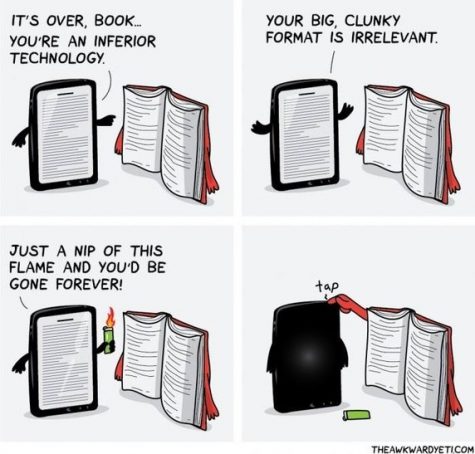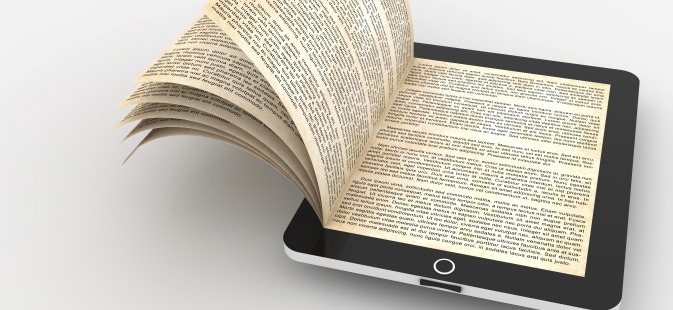Paper books vs Ebooks
The digital age is rapidly catching up to not only our phones and computers, but books as well. The amount of reading material and media online is increasing in forms of textbooks, newspapers, magazines, and regular books. Yet, one specific trend that has debuted in the last four years has been ereaders.
Ereaders have been hitting bookstores in mass amounts since 2012 when the publication of books on ebooks surpassed the publication of hardcover books. Many people find them appealing because they are cheaper than buying books in bulk, and they also provide more comfort, features, and availability to reference things easier.
Yet, the question is, do these revolutionary ebooks provide the same benefits as regular hardcover books?
It is scary to to think that regular paper books are becoming a thing of the past, but there is still a long way before they truly are gone, because they have so many characteristics. Because they have been around for centuries, there is a certain nostalgia that surrounds books, especially old ones. Text that has been on paper has linked the modern world to discoveries ranging from history to folktales, and they have revealed so much about the past.
There is also something special about walking to an antique book store and capturing the smell that consumes the vintage paper. Other than the sheer unique qualities that surround the physical character of a book, many studies show that paper books make reading and retaining information much more efficient.
A study conducted by Anne Mangen of Norway’s Stavanger University found readers absorb less on Kindles than they do on paper, according to the Guardian.
Another 2013 study by USA Today confirms that students comprehend less information on an ebook. There are countless other studies out there that reason how students perform better with paper books and how the concept of reading off of actual paper leads to more success, but that doesn’t mean ebooks are completely flawed either.
Ebooks and ereaders in general are on the rise due to the capacity of the digital era. Ereaders are beginning to carry more functions than just books, which makes them more appealing and convenient when traveling or when you just don’t have time to go to the library to pick up a book.
A huge benefit of ebooks in today’s society is the impact they have on the environment. There is a “go green” sentiment surrounding these portable books because they don’t require the natural resources or deforestation used to make millions of copies of hardcover books, thus saving the environment immensely. Joe Hutso from the New York Times introduced a new study analyzing the impact of kindles on the environment and it concluded that “ereaders could have a major impact on improving the sustainability and environmental impact on the publishing industry, one of the world’s most polluting sectors…In 2008, the US book and newspaper industries combined resulted in the harvesting of 125 million trees, not to mention wastewater that was produced or its massive carbon footprint.” Thus, ereaders are on the rise and fortunately for our environment, the benefits are on the rise too.
In terms of reading, the Center for Literacy at the University of Akron has been studying how to incorporate ebooks and technology into classrooms, and we see that right here in Vernon Hills with the induction of chromebooks and highly interactive websites like Kahoot and Peardeck. Through his study, director Jeremy Scott Brueck found that when he tested pre-K students, “a third knew the words before reading the story with a grown-up on an e-reader. After reading the e-book, the number shot up to 54 percent” finding that “animation and audio in ebooks did seem to help young kids identify printed words.” This leads to the fact that books and activities online create highly interactive environments and stimulate the brain much more. This can improve learning in the sense that the brain feels engaged and therefore performs higher. Although many studies show that people prefer paper books to ereaders, because ereaders come with functions like annotating, definitions, and margin notes that provide great resources when reading.
The books that you may find through a paper book or an ebook may be the same, but the control of each one on your reading style is very different. The true and ultimate answer in the battle between paper books and ebooks is that it is all about finding what suits you best and how you feel and perform when using each.


